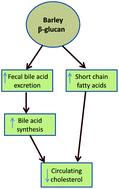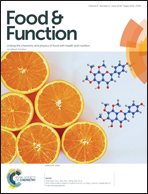Barley β-glucan increases fecal bile acid excretion and short chain fatty acid levels in mildly hypercholesterolemic individuals
Abstract
The cholesterol-lowering effect of barley β-glucan has been proposed to be the result of a pleiotropic effect, which involves several biological mechanisms such as gut fermentation, inhibition of intestinal cholesterol absorption and increased bile acid excretion and its synthesis. However, one of the recent studies from our laboratory indicated that increased bile acid excretion and subsequent increase in its synthesis, but not the inhibition of cholesterol absorption or synthesis might be responsible for the cholesterol-lowering effect of barley β-glucan. Accordingly, the primary objective of the present study was to investigate the concentration of bile acids (BA), neutral sterols (NS) and short chain fatty acids (SCFA) excreted through the feces by mildly hypercholesterolemic subjects who consumed diets containing barley β-glucan with varying molecular weights (MW) and concentrations. In a controlled, four phase, crossover trial, 30 mildly hypercholesterolemic but otherwise healthy subjects were randomly assigned to receive breakfast containing 3 g high MW (HMW), 5 g low MW (LMW), 3 g LMW barley β-glucan or a control diet for 5 weeks. The concentrations of BA, NS and SCFA in the feces were measured at the end of each treatment phase. Compared to the other treatment groups, 3 g day−1 HMW barley β-glucan consumption resulted in increased lithocholic acid (LCA) excretion (P < 0.001) but not LMW β-glucan, even at the high dose of 5 g day−1. Increased fermentability of fibre was also evident from a significant increase in fecal total SCFA concentrations in response to the 3 g HMW β-glucan diet compared to the 3 g LMW barley β-glucan and control diet (P = 0.0015). In summary, the current results validate our previous report on the role of fecal bile acid excretion in cholesterol lowering through the consumption of barley β-glucan. In addition, increased SCFA concentrations indicate that an increase in β-glucan molecular weight promotes hindgut fermentation, which might also be playing a role in attenuating cholesterol levels.



 Please wait while we load your content...
Please wait while we load your content...